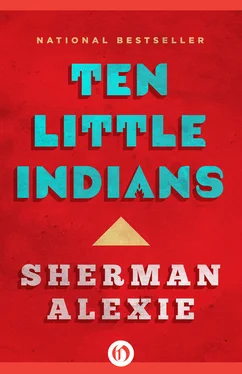“Come on,” she said. “If you stay home, I’ll make you Scooby.”
He laughed at the inside joke, created one night while he tried to give her sexual directions and was so aroused that he sounded exactly like Scooby-Doo.
“Stay home, stay home, stay home,” she chanted and wrapped herself tighter around him. He was supporting all of her weight, holding her two feet off the bed.
“I’m not strong enough to do this,” he said.
“Baby, baby, I’ll make you strong,” she sang, and it sounded like she was writing a Top 40 hit in the Brill Building, circa 1962. How could he leave a woman who sang like that? He hated to leave, but he loved his work. He was a man, and men needed to work. More sexism! More masculine tunnel vision! More need for gender-sensitivity workshops! He pulled away from her, dropping her back onto the bed, and stepped away.
“Willy Loman,” she said, “you must pay attention to me.”
“I love you,” he said, but she’d already fallen back to sleep — a narcoleptic gift William envied — and he wondered if she would dream about a man who never left her, about some unemployed agoraphobic Indian warrior who liked to cook and wash dishes.
William tiptoed into his daughter’s bedroom, expecting to hear her light snore, but she was awake and sitting up in bed, and looked so magical and androgynous with her huge brown eyes and crew-cut hair. She’d wanted to completely shave her head: I don’t want long hair, I don’t want short hair, I don’t want hair at all, and I don’t want to be a girl or a boy, I want to be a yellow and orange leaf some little kid picks up and pastes in his scrapbook.
“Daddy,” she said.
“Grace,” he said. “You should be asleep. You have school today.”
“I know,” she said. “But I wanted to see you before you left.”
“Okay,” said William as he kissed her forehead, nose, and chin. “You’ve seen me. Now go back to sleep. I love you and I’m going to miss you.”
She fiercely hugged him.
“Oh,” he said. “You’re such a lovely, lovely girl.”
Preternaturally serious, she took his face in her eyes and studied his eyes. Morally examined by a kindergartner!
“Daddy,” she said. “Go be silly for those people far away.”
She cried as William left her room. Already quite sure he was only an adequate husband, he wondered, as he often did, if he was a bad father. During these mornings, he felt generic and violent, like some caveman leaving the fire to hunt animals in the cold and dark. Maybe his hands were smooth and clean, but they felt bloody.
Downstairs, he put on his socks and shoes and overcoat and listened for his daughter’s crying, but she was quiet, having inherited her mother’s gift for instant sleep. She had probably fallen back into one of her odd little dreams. While he was gone, she often drew pictures of those dreams, coloring the sky green and the grass blue — everything backward and wrong — and had once sketched a man in a suit crashing an airplane into the bright yellow sun. Ah, the rage, fear, and loneliness of a five-year-old, simple and true! She’d been especially afraid since September 11 of the previous year and constantly quizzed William about what he would do if terrorists hijacked his plane.
“I’d tell them I was your father,” he’d said to her before he left for his last business trip. “And they’d stop being bad.”
“You’re lying,” she’d said. “I’m not supposed to listen to liars. If you lie to me, I can’t love you.”
He couldn’t argue with her logic. Maybe she was the most logical person on the planet. Maybe she should be illegally elected president of the United States.
William understood her fear of flying and of his flight. He was afraid of flying, too, but not of terrorists. After the horrible violence of September 11, he figured hijacking was no longer a useful weapon in the terrorist arsenal. These days, a terrorist armed with a box cutter would be torn to pieces by all of the coach-class passengers and fed to the first-class upgrades. However, no matter how much he tried to laugh his fear away, William always scanned the airports and airplanes for little brown guys who reeked of fundamentalism. That meant William was equally afraid of Osama bin Laden and Jerry Falwell wearing the last vestiges of a summer tan. William himself was a little brown guy, so the other travelers were always sniffing around him, but he smelled only of Dove soap, Mennen deodorant, and sarcasm. Still, he understood why people were afraid of him, a brown-skinned man with dark hair and eyes. If Norwegian terrorists had exploded the World Trade Center, then blue-eyed blondes would be viewed with more suspicion. Or so he hoped.
Locking the front door behind him, William stepped away from his house, carried his garment bag and briefcase onto the front porch, and waited for his taxi to arrive. It was a cold and foggy October morning. William could smell the saltwater of Elliott Bay and the freshwater of Lake Washington. Surrounded by gray water and gray fog and gray skies and gray mountains and a gray sun, he’d lived with his family in Seattle for three years and loved it. He couldn’t imagine living anywhere else, with any other wife or child, in any other time.
William was tired and happy and romantic and exaggerating the size of his familial devotion so he could justify his departure, so he could survive his departure. He did sometimes think about other women and other possible lives with them. He wondered how his life would have been different if he’d married a white woman and fathered half-white children who grew up to complain and brag about their biracial identities: Oh, the only box they have for me is Other! I’m not going to check any box! I’m not the Other! I am Tiger Woods! But William most often fantasized about being single and free to travel as often as he wished — maybe two million miles a year — and how much he’d enjoy the benefits of being a platinum frequent flier. Maybe he’d have one-night stands with a long series of traveling saleswomen, all of them thousands of miles away from husbands and children who kept looking up “feminism” in the dictionary. William knew that was yet another sexist thought. In this capitalistic and democratic culture, talented women should also enjoy the freedom to emotionally and physically abandon their families. After all, talented and educated men have been doing it for generations. Let freedom ring!
Marie had left her job as a corporate accountant to be a full-time mother to Grace. William loved his wife for making the decision, and he tried to do his share of the housework, but he suspected he was an old-fashioned bastard who wanted his wife to stay at home and wait, wait, wait for him.
Marie was always waiting for William to call, to come home, to leave messages saying he was getting on the plane, getting off the plane, checking in to the hotel, going to sleep, waking up, heading for the meeting, catching an earlier or later flight home. He spent one third of his life trying to sleep in uncomfortable beds and one third of his life trying to stay awake in airports. He traveled with thousands of other capitalistic foot soldiers, mostly men but increasing numbers of women, and stayed in the same Ramadas, Holiday Inns, and Radissons. He ate the same room-service meals and ran the same exercise-room treadmills and watched the same pay-per-view porn and stared out the windows at the same strange and lonely cityscapes. Sure, he was an enrolled member of the Spokane Indian tribe, but he was also a fully recognized member of the notebook-computer tribe and the security-checkpoint tribe and the rental-car tribe and the hotel-shuttle-bus tribe and the cell-phone-roaming-charge tribe.
William traveled so often, the Seattle-based flight attendants knew him by first name.
Читать дальше












